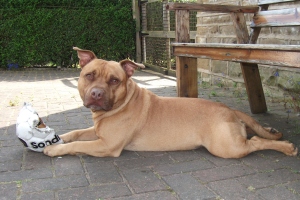Destructive Chewing Behaviour in Dogs and How to Cope With it.
In contrast to typical chewing behaviour in puppies, destructive chewing in dogs between six and twelve months of age, is another common behaviour and can be frustrating for owners. It is also sometimes known as adolescent, or exploratory, chewing. This Holidays4Dogs article will look at the reasons why dogs might chew and what owners can do to limit damage to their home during this period.
Puppies under six months will usually have a natural desire to chew in order to relieve discomfort during the puppy teething stage. Chewing also helps to remove puppy teeth, as adult teeth push through.
In adolescent dogs there could be a number of reasons for continued chewing behaviour;
- Young dogs will use their mouths in order to discover things about their environment. It may also be because they still have some gum discomfort due to their recent adult teeth emerging.
- Separation anxiety. Being left alone, especially for long periods, can encourage a dog to chew inappropriately.
- Boredom is another common reason why dogs will resort to chewing behaviour. Dogs with high activity levels, such as border collies and spaniels, require a great deal of both mental and physical stimulation. Without this, they will often create their own entertainment in the form of destructive chewing.
- Diet can sometimes be the cause of inappropriate chewing – chewing plaster walls, for instance, can sometimes be caused by an unbalanced diet, or even hunger.
- Rescue dogs. Dogs that have been kennelled from a fairly young age, can sometimes turn out to be hardened chewers once they move to a home environment. This is because they have been unable to explore their environment and engage in natural chewing behaviour.
It is important to remember that chewing is a normal behaviour in the dog’s eyes. He is not to know what things he can and cannot chew, so it is important to teach him this as he matures. Dogs do not chew out of spite, or with any determination to damage, or destroy household items, through malice.
 Things you can do to help your dog.
Things you can do to help your dog.
- Make sure that you remove any valuable, or loose, objects. Limit your dog’s access to places where there are harmful, or expensive, items.
- Provide your dog with lots of appropriate chews. Have several different types, so you can rotate them.
- Never punish your dog for chewing as this will not solve the problem.
- Exercise your dog appropriate to his needs and try to take him to as many different places as you can, allowing him to explore his environment. Playing with your dog is equally as important in-between outdoor exercise. Aim for a few minutes play time, three or four times a day.
Types of chews.
- Dental chews.
- Activity balls are designed to be tough and have holes into which you can place titbits. As the ball rolls around, the titbits fall out for the dog to eat.
- Kong toy. Robust, rubber toys, which can be filled with food. However, a determined chewer could still nibble bits of rubber from these, so always supervise and monitor your dog.
- Natural teeth cleaners such as raw carrots.
When the adolescent dog matures into adulthood, his desire to chew things will decrease. However, all dogs still benefit from having chew treats, which helps with boredom keeps teeth clean.
holidays4dogs.co.uk and 4Dogs are participants in the Amazon Services LLC Associates Program, an affiliate advertising program designed to provide a means for sites to earn commission fees by advertising and linking to the following web sites. Read our full disclosure agreement here.



